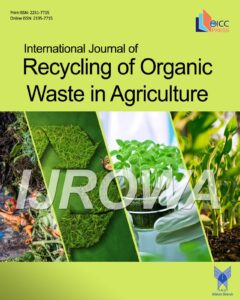Effects of irrigation with municipal treated wastewater on soil’s heavy metals accumulation and turf leaves under drip and sprinkler systems (Case study: Agadir, Southern Morocco)
Authors
-
Nadia El-Ouahmani
 1
1
-
Abir Chahouri
 1
1
-
Abderrahmane Zekhnini
 1
1
-
Khalid Azim
 2
2
-
Redouane Choukr-Allah
 3
3
-
Bouchra Yacoubi
 1
1
Abstract
Purpose Treated wastewaters are reused in agriculture to deal with the water deficit, especially in arid and semi-arid regions. However, they may contain contaminants such as heavy metals that can adversely affect the soil quality and life health. This work aimed to assess the degree of contamination of the soil and the turf leaves of a golf course irrigated in the long term (10 years) by treated wastewaters.
Method Analysis of eight heavy metals (Cd, Co, Cr, Cu, Ni, Mn, Fe and Zn) was carried out at two sites. The first was irrigated by sprinkling (site 1), the second by a drip system (site 2).
Results The results showed a generalized contamination of the soil at the two sites. Fe and Mn recorded the highest levels. Cd and Cr contents were significantly higher in the soil of site 1. However, all the heavy metals recorded values below the limits set by the FAO / WHO standards for soil. Turf leaves also exhibited high values of Fe and Mn contents in the two sites. Mn content was significantly higher in in the turf leaves from site 1. The results showed an accumulation of all the metals in turf leaves in which the Fe and Cd contents exceeded the FAO / WHO standards.
Conclusion Long-term irrigation results in an accumulation of heavy metals in the soil and in turf leaves. Particular attention should be paid to Cd and Fe for the use of treated wastewater in agriculture. Drip irrigation system would minimize crop contamination.



